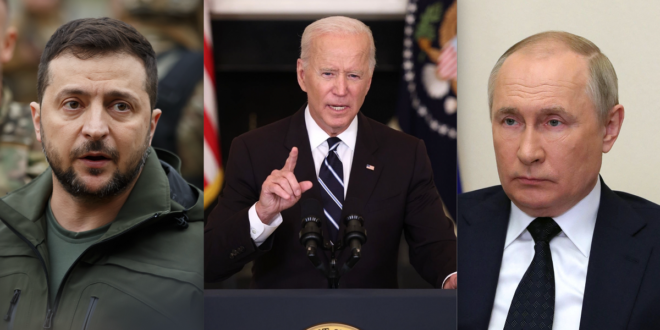Now that Kyiv is in a strong position to negotiate, the US must flex its diplomatic muscles to bring both sides to the table.
Since Russia’s invasion of Ukraine last February, the United States has strived for two primary objectives: to prevent Putin from re-subjugating the country and to put the Ukrainian government in a strong position to negotiate a settlement that ensures its independence and sovereignty.
More than ten months into this ongoing war, we have achieved both these fundamental goals.
Ukraine’s successes on the battlefield have provided it with substantial leverage to shape the terms of any settlement. By contrast, Russia’s retreat from Kherson means that its aspirations to capture Ukraine’s southern coast are no longer realistic. Without Kherson as a staging area, Putin’s prospects for turning Ukraine into a landlocked rump state have all but disappeared.
As a result, the question of whether Putin can reincorporate Ukraine into Moscow’s imperium has been answered. So long as the West sustains its wartime support for Kyiv, controlling the vast bulk of Ukraine will remain beyond his grasp.
This success story does not mean that either Russia or Ukraine is yet ready for serious negotiations. But it offers a window of opportunity for the United States to prepare the diplomatic ground for an eventual settlement of the conflict — a window that may get smaller over time if we do not act now. The goal of this preparation should be to put Russia on a path toward accepting a limited defeat that protects our and Ukraine’s core security concerns.
One part of this effort will require persuading Ukraine that its only viable path to a secure and prosperous future is through a negotiated settlement with Russia. Many Ukrainians, particularly hardline nationalists, believe Ukraine can and must recapture all occupied Ukrainian territory, including the Crimean peninsula, which Russia annexed in 2014. But because Russia has an enormous nuclear arsenal and still untapped escalatory potential, unconditional Ukrainian victory in this war will not be achievable. Attempting to recapture Crimea would significantly increase the chances of Russian escalation and direct a U.S.-Russian military clash.
Moreover, Ukraine’s economic reconstruction cannot succeed without a durable armistice. Repairing the damage wrought by the war will take years and hundreds of billions of dollars in assistance. But no one will invest heavily in reconstruction so long as the threat of new Russian attacks remains active. Although Russia’s military has proven incapable of occupying the bulk of Ukraine, it remains quite capable of destroying significant parts of Ukraine from afar and ensuring that it is in no condition to rebuild itself and join the West. Absent an agreed settlement, Ukraine may well be headed toward a de facto partition in which Russia controls significant parts of the Donbas and has rendered large swaths of Ukrainian territory that lie to its west a virtual no-man’s land.
U.S. officials should take care that efforts to convince Ukrainians of these realities do not erupt into a public dispute, as that would undermine one of the primary signals that must be sent to Russia if we are to bring Putin to the negotiating table: that we are committed to supporting Ukraine’s self-defense effort for as long as necessary.
Putin and his generals surely recognize by now that they cannot win a war of maneuver in Ukraine; the combination of Ukraine’s courage and fighting prowess with advanced American intelligence and weaponry makes that all but impossible. But Putin retains hope that he can win a war of attrition, and he is clearly keeping a watchful eye on the possibility that Western resolve will waver, looking for signs that Russia can reverse its fortunes on the battlefield simply because Ukraine will run out of support. We should give him no reason for such hope.
But getting Russia to the negotiating table will also require pairing that show of resolve with a subtler message for the Kremlin: that we recognize the United States and Russia both have valid security interests at stake, and that we are open to discussing how to address them.
One of these interests is shared: to prevent an escalation into war between our two nations that could possibly lead to mutual destruction. In this regard, we should actively seek to deepen discussions with the Russians aimed at minimizing the chances that misperceptions and miscommunications produce a direct military clash that neither side wants.
Another set of U.S. and Russian interests is clearly in conflict, however. Russia wants guarantees that Ukraine will not become a U.S. or NATO ally. We need assurances that Ukraine will remain independent of Russia and secure from attacks, and we do not want to close NATO’s long standing open-door policy.
Presently, the Russians are convinced that the United States will not budge on this matter. They see no prospect that engaging with us — or Ukraine — will bear any fruit. We therefore need to couple our efforts to show Putin that he cannot win on the battlefield with diplomatic steps that suggest engagement is worthwhile.
Unilateral concessions to bring Russia to the table would be a mistake. But the U.S. can nonetheless signal its recognition that compromise will ultimately be necessary by underscoring its support for the longstanding OSCE principle of the “indivisibility of security” — in other words, that the security of one side cannot be gained without ensuring some measure of security for the other.
In this context, we can also float the possibility that verifiable and legally binding arms control and confidence-building measures might limit Ukraine’s ability to host American military bases or strategic weaponry that the Russians perceive as threatening, while simultaneously assuring us and Ukraine that Russia will be in no position to repeat its invasion without detection well in advance by our intelligence services. And we should imply that progress toward such an arrangement will only be possible with disengagement between Russian and Ukrainian forces.
Beyond these efforts with the Russian and Ukrainian governments, the Biden administration must persuade the publics in Ukraine, the U.S., and Europe of the necessity and viability of such a settlement, and the compromises it will take to achieve it. The first step toward this is emphasizing the extreme unlikelihood of the total Russian defeat and unconditional surrender that some hawks have called for.
Ukraine has already accomplished the most important goal of the war: denying Russia the ability to erase Ukrainian independence. The war has taken an immense toll on Russian military strength, and U.S. intelligence has proven adept at detecting and warning about Russia’s moves — both of which would serve as post-settlement insurance that Russia will not reprise its invasion.
But protracted war would keep Ukraine in economic freefall, ensure Russia continues to degrade the country’s infrastructure, and make reconstruction practically impossible. Only with peace can Ukraine take advantage of its successes in beating back Russia’s invasion. While a settlement may not be possible for some time, U.S. officials can start laying its foundations today.
 Eurasia Press & News
Eurasia Press & News




